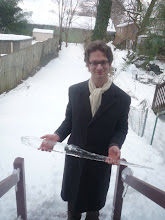The Bayberry Years
By Nathan Turowsky
Prologue
It was a cold morning at the beginning of December, before the snows but undoubtedly after the fall was through, and the narrow streets of the city were full of fog. Through the streets from the dreary banlieues of South Boston all the way up to the ancient brick mansions of Beacon Hill came a young man with a bag of groceries on his shoulder and a packet full of several pill-bottles in the pocket of his coat. He walked along the cobbles, not navigable by automobile traffic, and through the fog under the out-of-date streetlights til before him was the apparition of a thick dark wooden door.
The house that he now looked upon was not one of the oldest ones in the neighbourhood but it was old enough to impress one who had grown up in a borderline tenement, last of the seven children of a very traditional Irish Catholic family. It was built of brick brilliantly red even in this sort of weather, with shaped and somehow reinforced stucco cornices and one granite gargoyle. The roof of the house was steeply pitched on many levels, so that looking at it from below was almost like looking at the jagged Western mountains that the young man had seen in his geography textbooks in high school. The roof—or roofs, rather; the roofs were slatted in black-tarred wood, which the mistresses of the house every spring had to hire a new contractor to repair.
There was not much in the way of a front garden—most of that sort of thing was in the back. There was just a short walk between two lines of burgeoning boxwood shrubs up to the front stoop and the door. Other than the shrubs the only thing there to break the solid line from pavement to stoop was a mailbox, green plastic with the Boston Globe logo stamped on it in white, with its red flag now up as they apparently were awake and had put the mail out already.
‘Already…’ The young man laughed. They were ridiculously early risers for their age. It was rather endearing in some way.
The mailbox had two names on it, other than that of the newspaper, affixed to it in durable black vinyl tape with white lettering upon it: I. Crowninshield and F. Greenleaf. Crowninshield and Greenleaf were names with true old-Boston pedigrees. John Caspar Crowninshield had come to Massachusetts in 1688 from Germany and founded a long and storied seafaring family; the Greenleafs were not so old or well-established as the Crowninshields but they were quite rich and had been for some time. There were not many living people with those names alive these days, though; the old hold of the Brahmins of the city had been weakened in the time of Honey Fitz and finally destroyed by the 1960s or thereabouts. The families still existed in name, most of them; but even some of those names were dying out.
The young man did not think of this as he opened the door and went into the wood-walled front hall with its hanging sea-paintings and impossible and imperishable smell of cod. He, David Lenihan, was paid thirty-one thousand five hundred dollars a year plus some personal medical coverage out of some weird and wicked rich-people plan to make sure that the two old ladies who lived here were doing all right in their daily lives. It was a job that he liked a lot, mostly. The old ladies were gay but David had no real problem with this. It was actually kind of sweet, since early on they probably hadn’t had an easy time and they’d stayed together anyway. Isabel Crowninshield had been a high-ranking customs inspector at the Port of Boston until retiring about eight or nine years ago. Flora Greenleaf had been involved in patronage of the arts and had been involved in printing and publishing for a while, but apparently this career had eventually gone belly-up somehow.
‘David?’ came a soft, high, quavering, croaking voice from up the big dark-wooden staircase with the motorised chair on a rail affixed to the banister. ‘Is that you, David?’
‘Yes, Miz C,’ David called back. ‘Putting some vegetables an’ stuff away. Gonna refill your med trays too.’
‘Ah,’ the voice came again. ‘Good, good. After that, David, please come up here. Flora and I want to discuss a few things with you.’


